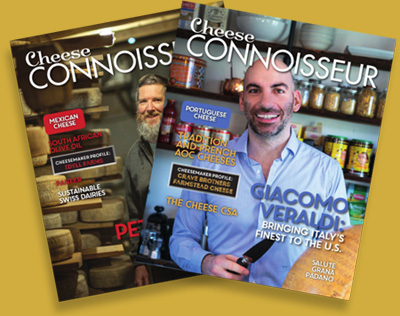I like to equate the rise of Sweet Cheddars to Breakfast Cereal. My grandmother was born in 1892, and her breakfast choice was oatmeal, although some new-fangled cereals were invented when she was a child. All were healthy and none had added sugar.
Today, cereals have insane levels of sugar and breakfast has become the least healthy meal with little differentiation between products. To break into the cereal market, a company must be a large corporation with deep pockets.
Sweet Cheddar may evolve into a similar scenario. Some people predict that Cheddar, Gouda and most Alpine cheeses will meld together and have the same flavor profile. I predict that Sweet Cheddar will bring artisanal cheesemaking Cheddar producers to a grinding halt, giving industrial producers the edge.
The culprit is the culture, lactobacillus helveticas, which adds a sweet, nutty flavor to Cheddars. And, as one cheesemaker told me, “My customers love it, and sales have grown because of it.” Helveticas is not evil. It is also used to make Gouda and many Alpine cheeses, where it adds a traditional note. Yet, Helveticus does not add sugar to cheese.
Traditionally, English Cheddars do not use Helveticas and have a brighter, tangy note. They are more complex, and seasonal flavors are apparent. Typically bandaged-wrapped, they have cave-aged notes of earthiness.
Nor did early American cheesemakers include Helveticas. There were considerable differences between Cheddars due to different milks, cow’s feed, terroir and the cheesemakers themselves. Even from batch to batch there were slight differences. There used to be distinct differences between New England Cheddar, Wisconsin Cheddar and Canadian Cheddars, and they were marketed as such.
Helveticas does the opposite. It adds sweetness and helps to hide bitterness and old or poor-quality milk flavors. The result is flattening of flavors and losing the unique properties of a great Cheddar. It makes Cheddar more familiar.
Should Sweet Cheddars prevail, we chance to lose others that are great. If we are not careful, Cheddar sales may well be determined by price alone, leaving out the high-quality, artisanal producers that concentrate on animal welfare, grass fed, raw milk and strict adherence to quality controls to produce clean milk and faultless flavor and texture.
If we continue more to the middle of the road, Cheddar will be nothing more than a commodity cheese controlled by large corporations; the next shredded wheat or oatmeal.



